Leininger Application of Leininger’s Culture Care Theory in Family Medical History
Added on 2022-05-31
25 Pages6298 Words62 Views
University of South DakotaUniversity of South Dakota
USD REDUSD RED
Honors Thesis Theses, Dissertations, and Student Projects
Spring 2019
Application of Leininger’s Culture Care Theory in Family MedicalApplication of Leininger’s Culture Care Theory in Family Medical
HistoryHistory
Avery Del GrossoUniversity of South Dakota
Follow this and additional works at: https://red.library.usd.edu/honors-thesis
Recommended CitationRecommended Citation
Del Grosso, Avery, "Application of Leininger’s Culture Care Theory in Family Medical History" (2019).Honors Thesis. 43.
https://red.library.usd.edu/honors-thesis/43
This Honors Thesis is brought to you for free and open access by the Theses, Dissertations, and Student Projects
at USD RED. It has been accepted for inclusion in Honors Thesis by an authorized administrator of USD RED. For
more information, please contact dloftus@usd.edu.
USD REDUSD RED
Honors Thesis Theses, Dissertations, and Student Projects
Spring 2019
Application of Leininger’s Culture Care Theory in Family MedicalApplication of Leininger’s Culture Care Theory in Family Medical
HistoryHistory
Avery Del GrossoUniversity of South Dakota
Follow this and additional works at: https://red.library.usd.edu/honors-thesis
Recommended CitationRecommended Citation
Del Grosso, Avery, "Application of Leininger’s Culture Care Theory in Family Medical History" (2019).Honors Thesis. 43.
https://red.library.usd.edu/honors-thesis/43
This Honors Thesis is brought to you for free and open access by the Theses, Dissertations, and Student Projects
at USD RED. It has been accepted for inclusion in Honors Thesis by an authorized administrator of USD RED. For
more information, please contact dloftus@usd.edu.
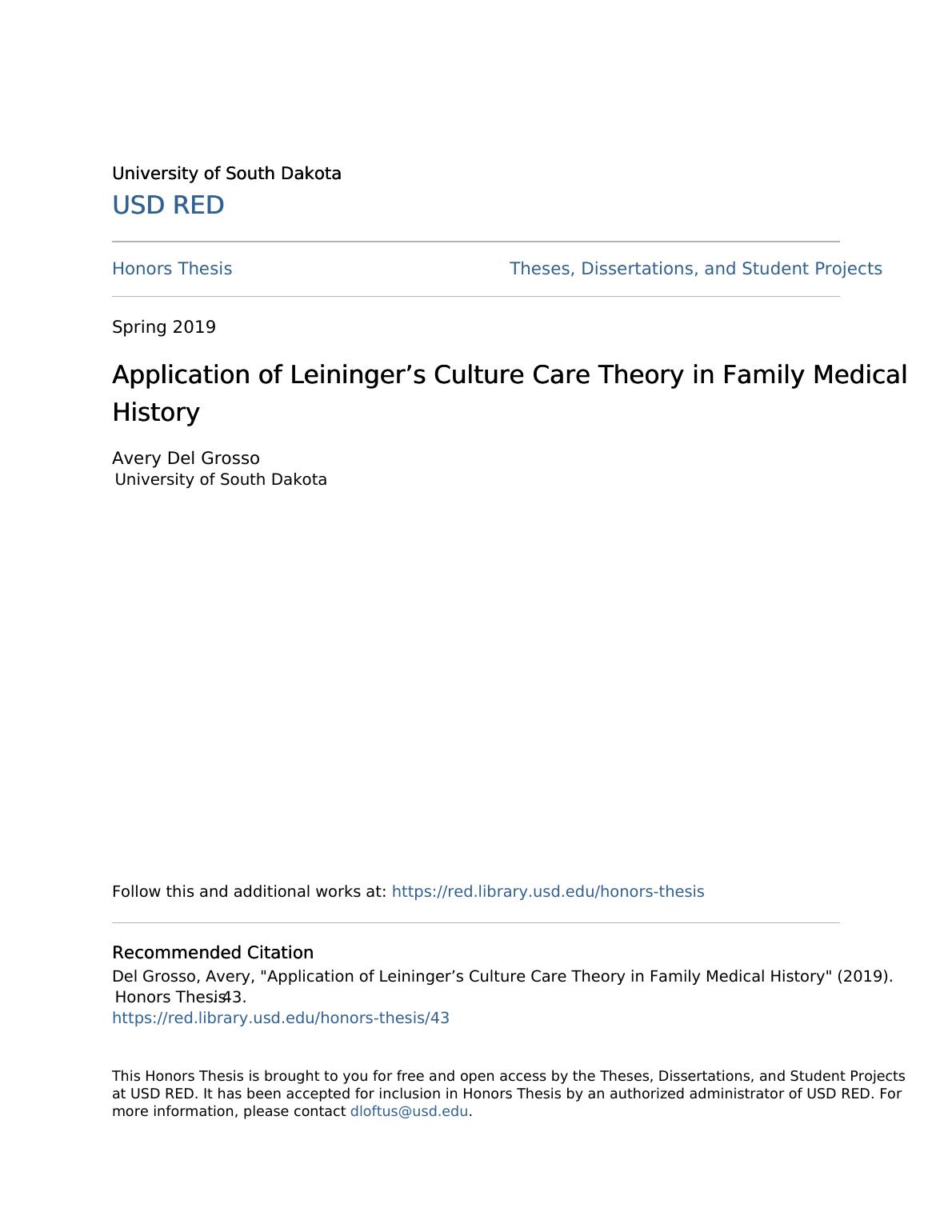
Application of Leininger’s Culture Care Theory in Family Medical History
By
Avery Del Grosso
A Thesis Submitted in Partial Fulfillment
Of the Requirements for the
University Honors Program
Department of Education
The University of South Dakota
May 2019
By
Avery Del Grosso
A Thesis Submitted in Partial Fulfillment
Of the Requirements for the
University Honors Program
Department of Education
The University of South Dakota
May 2019
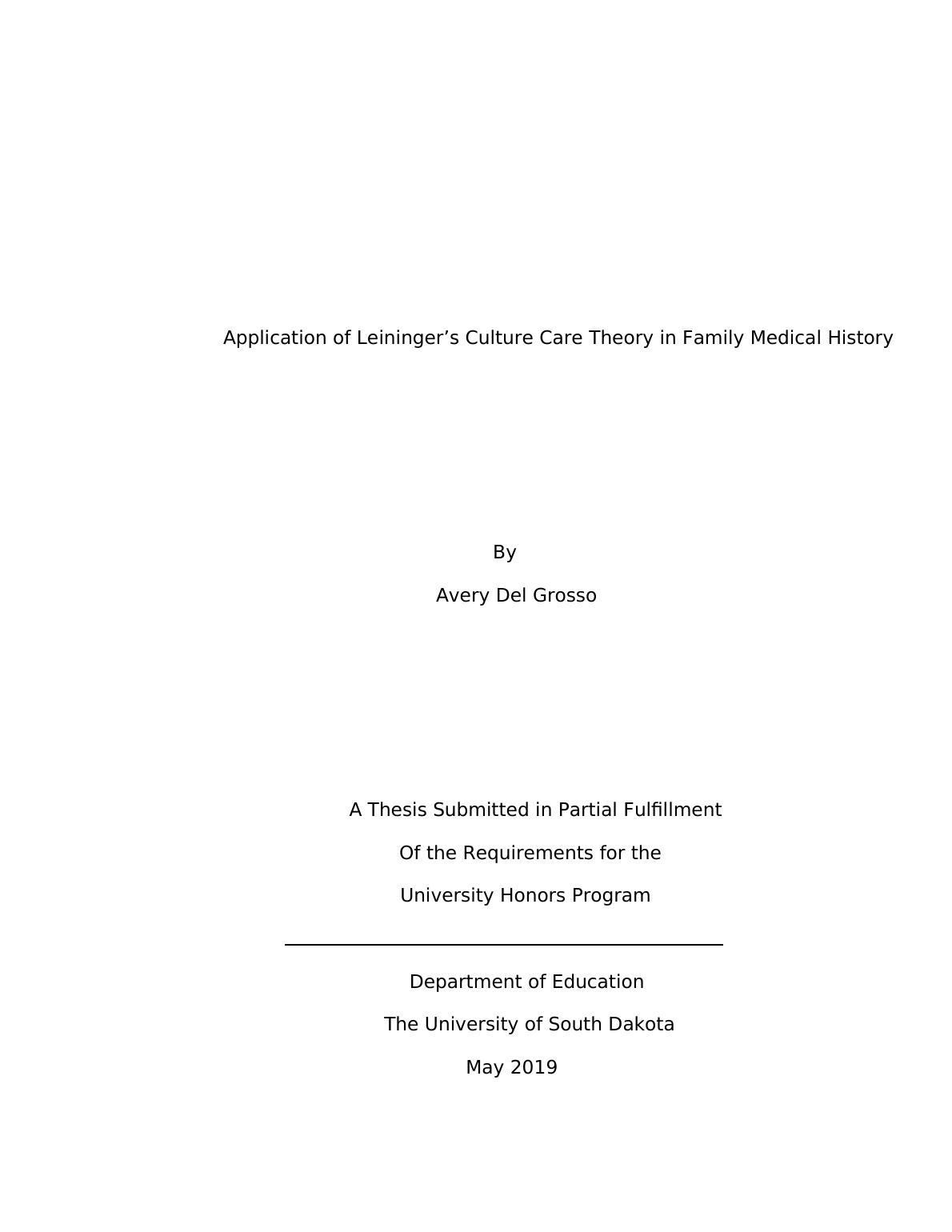
The members of the Honors Thesis Committee appointed
to examine the thesis of Avery Del Grosso
find it satisfactory and recommend that it be accepted.
Dr. Mejai Bola Avoseh
Professor of Educational Administration
Director of the Committee
Dr. Carole South-Winter
Assistant Professor of Healthcare Administration
Dr. Scott Breuninger
Honors Program Director
to examine the thesis of Avery Del Grosso
find it satisfactory and recommend that it be accepted.
Dr. Mejai Bola Avoseh
Professor of Educational Administration
Director of the Committee
Dr. Carole South-Winter
Assistant Professor of Healthcare Administration
Dr. Scott Breuninger
Honors Program Director
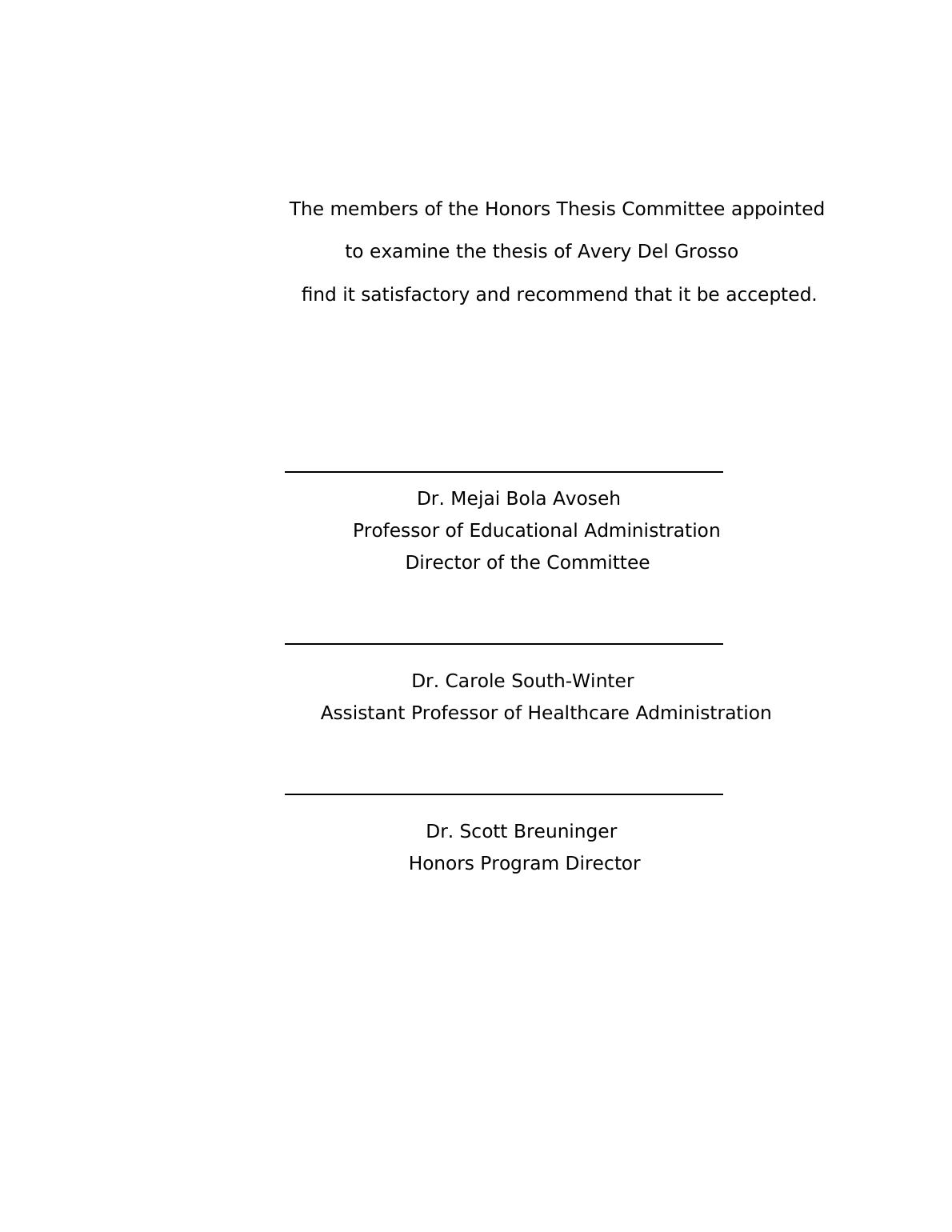
ABSTRACT
Application of Leininger’s Culture Care Theory in Family Medical History
Avery Del Grosso
Director: Mejai Bola Avoseh, Ph.D.
One of the very first interactions a patient has with medical staff is a one-on-one
interview to ascertain family medical history. However, the practice of recording patient
medical history has remained relatively unchanged for decades since the advent of
modern medicine. This begs a question of if there is a way to improve the current status
quo. Leininger’s Culture Care Theory and Sunrise Model implement both an innovative
and patient-centered focus that acknowledges and incorporates patients’ cultural
backgrounds into their healthcare plan. Combining Leininger’s Culture Care Theory with
the current process of recording family medical history will modernize a somewhat
antiquated aspect of modern healthcare, benefitting both patients and healthcare
professionals alike.
KEYWORDS: Leininger, Culture Care, Medical History, Globalization, Sunrise Model,
Application of Leininger’s Culture Care Theory in Family Medical History
Avery Del Grosso
Director: Mejai Bola Avoseh, Ph.D.
One of the very first interactions a patient has with medical staff is a one-on-one
interview to ascertain family medical history. However, the practice of recording patient
medical history has remained relatively unchanged for decades since the advent of
modern medicine. This begs a question of if there is a way to improve the current status
quo. Leininger’s Culture Care Theory and Sunrise Model implement both an innovative
and patient-centered focus that acknowledges and incorporates patients’ cultural
backgrounds into their healthcare plan. Combining Leininger’s Culture Care Theory with
the current process of recording family medical history will modernize a somewhat
antiquated aspect of modern healthcare, benefitting both patients and healthcare
professionals alike.
KEYWORDS: Leininger, Culture Care, Medical History, Globalization, Sunrise Model,
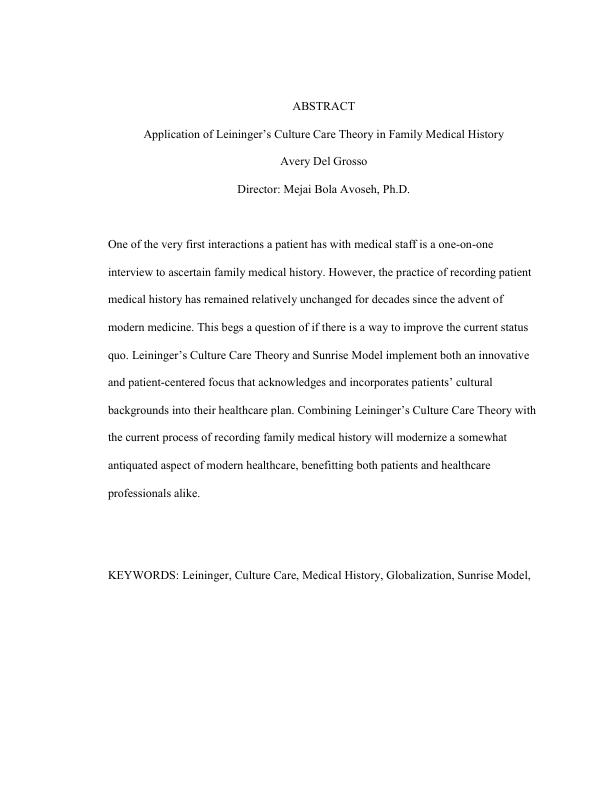
iv
TABLE OF CONTENTS
INTRODUCTION 1
FAMILY MEDICAL HISTORY 1
GLOBALIZATION 3
LEININGER’S THEORY OF CULTURE CARE (LTCC) 4
SUNRISE MODEL 5
THE FACTOR OF KINSHIP 7
WESTERN INDIVIDUALISM 8
INDIGINOUS COLLECTIVISM 9
LTCC AND FAMILY MEDICAL HISTORY 10
INCORPORATING LTCC INTO FAMILY MEDICAL HISTORY 11
CHALLENGES OF IMPLEMENTING LTCC 13
CONCLUSION 15
BIBLIOGRAPHY 17
TABLE OF CONTENTS
INTRODUCTION 1
FAMILY MEDICAL HISTORY 1
GLOBALIZATION 3
LEININGER’S THEORY OF CULTURE CARE (LTCC) 4
SUNRISE MODEL 5
THE FACTOR OF KINSHIP 7
WESTERN INDIVIDUALISM 8
INDIGINOUS COLLECTIVISM 9
LTCC AND FAMILY MEDICAL HISTORY 10
INCORPORATING LTCC INTO FAMILY MEDICAL HISTORY 11
CHALLENGES OF IMPLEMENTING LTCC 13
CONCLUSION 15
BIBLIOGRAPHY 17
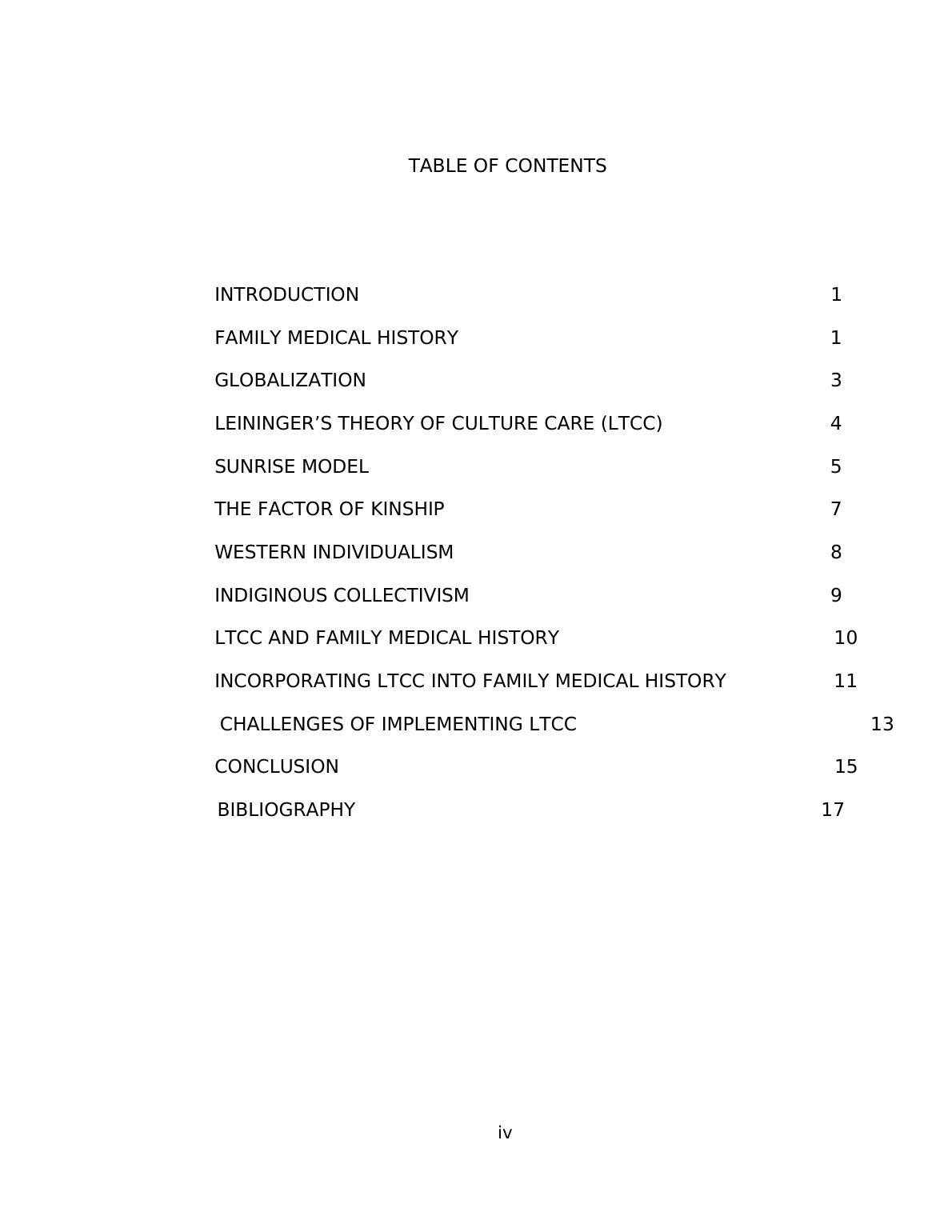
1
INTRODUCTION
The technological boom of the 21st century has interconnected the world to an
unprecedented extent. The side effects of this interconnectedness can be seen in the
healthcare system. It is entirely plausible that a person may go from one side of the world
to the other and find themselves in a hospital. Given the fact above, the United States
(U.S.) healthcare system must be able to adapt and accommodate patients of different
cultures and worldviews. Madeleine M. Leininger created her Theory of Culture Care and
Sunrise Model to address the challenge globalization has placed upon healthcare in the
United States. There are seven key influences on Culture Care within the Sunrise Model,
one of which is Kinship and Social Factors. To the Western world, kinship may seem
straightforward, referring to direct family members or blood relatives. However, in
Eastern collectivist cultures, kinship takes on a much different meaning. Kinship can be
made up of one’s direct family ties as well as neighbors, friends, and extended family.
Put into this context, this thesis seeks to elucidate how Leininger’s Culture Care Theory
can improve the current system of information regarding patient family medical history.
FAMILY MEDICAL HISTORY
According to the National Institute of Health, a family medical history is a record
of health information about a person and their closest relatives. One’s medical history can
give clues to pathology, chronic illness, or potential risk factors for disease. Even so, it
does not necessarily mean with certainty that a patient will develop a condition.
Typically, family medical history is collected via a self-disclosing questionnaire by the
patient or an interview with a medical professional. It is unclear precisely when recording
family medical history became common, standardized practice. However, the discovery
INTRODUCTION
The technological boom of the 21st century has interconnected the world to an
unprecedented extent. The side effects of this interconnectedness can be seen in the
healthcare system. It is entirely plausible that a person may go from one side of the world
to the other and find themselves in a hospital. Given the fact above, the United States
(U.S.) healthcare system must be able to adapt and accommodate patients of different
cultures and worldviews. Madeleine M. Leininger created her Theory of Culture Care and
Sunrise Model to address the challenge globalization has placed upon healthcare in the
United States. There are seven key influences on Culture Care within the Sunrise Model,
one of which is Kinship and Social Factors. To the Western world, kinship may seem
straightforward, referring to direct family members or blood relatives. However, in
Eastern collectivist cultures, kinship takes on a much different meaning. Kinship can be
made up of one’s direct family ties as well as neighbors, friends, and extended family.
Put into this context, this thesis seeks to elucidate how Leininger’s Culture Care Theory
can improve the current system of information regarding patient family medical history.
FAMILY MEDICAL HISTORY
According to the National Institute of Health, a family medical history is a record
of health information about a person and their closest relatives. One’s medical history can
give clues to pathology, chronic illness, or potential risk factors for disease. Even so, it
does not necessarily mean with certainty that a patient will develop a condition.
Typically, family medical history is collected via a self-disclosing questionnaire by the
patient or an interview with a medical professional. It is unclear precisely when recording
family medical history became common, standardized practice. However, the discovery
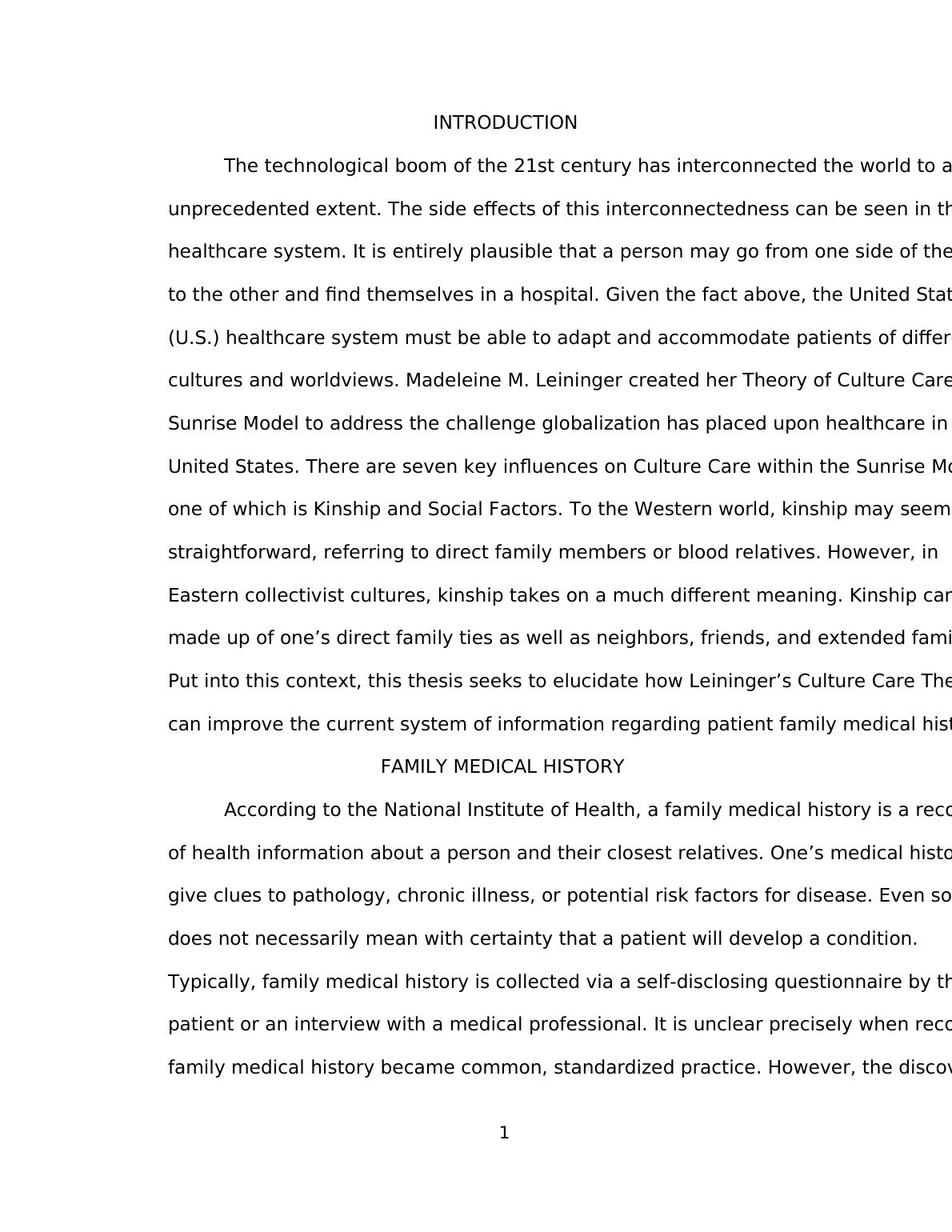
End of preview
Want to access all the pages? Upload your documents or become a member.